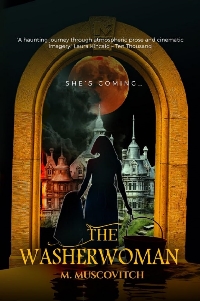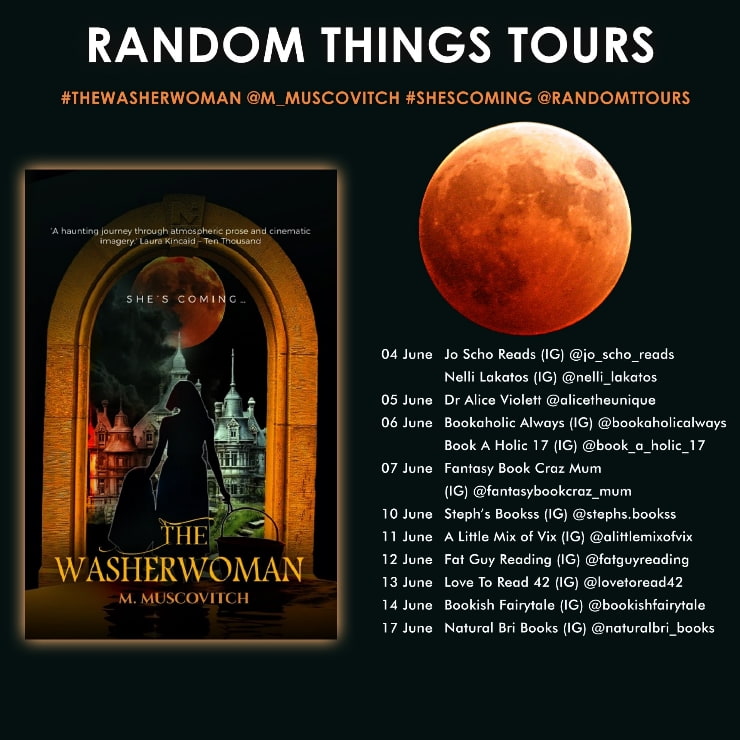Blog tour: The Washerwoman - excerpt

This post is part of a blog tour organised by Random Things Blog Tours. I received a free copy of the book in return for an excerpt post.
The book
‘In the shadowed heart of the Scottish Highlands lies a village bound by a chilling secret. When Adam and his friend arrive for a wild swimming competition, they unwittingly step into a world where folklore and reality entwine.

‘In The Washerwoman, a haunting tale unfolds as Adam is drawn into the legend of the Bean Nighe, a spectral figure seen washing the blood-stained clothes of those destined to die. His nights are plagued by unsettling dreams that echo the village’s dark past, a past that seems inexplicably linked to his own family history.
‘As Adam delves deeper, aided by a number of allies, he unravels a tapestry of tragedy that dates back to 1833, when a woman’s death in childbirth gave birth to a curse. With each step closer to the truth, the Bean Nighe’s presence grows more ominous, and the villagers’ whispers turn to silence, hiding a pact sealed in shadow and fear.
‘But the waters of the past are deeper and more treacherous than Adam could have imagined. The closer he gets to uncovering the mystery, the more he realises that the Bean Nighe’s mournful washing is not just a sign of death but a herald of a legacy that he is bound to.
‘From the misty lochs of the Highlands to the hidden secrets of a secluded village, The Washerwoman weaves a tale of supernatural horror, ancestral curses, and the inescapable grip of fate. Adam must confront the ghostly echoes of a long-forgotten history, or risk becoming another thread in the Bean Nighe’s morbid tapestry.’
The author

M. Muscovitch is the chosen pen name of a dedicated headteacher from Yorkshire, England, who straddles the worlds of education and intricate storytelling. His professional life is deeply committed to fostering a love for reading and imparting values through children’s literature, serving as a rich foundation for his venture into adult fiction.
The pen name M. Muscovitch pays homage to his ancestral roots in Warsaw in the 1890s, reflecting a lineage that carries the whispers of Eastern European tales and the enigmatic change of his family’s surname from Muscovitch to Walker for reasons lost to history. This mysterious alteration in identity, coupled with his Scottish ancestry tracing back to the earliest records and familial ties to Liverpool and Northumberland, infuses his writing with a depth of historical and geographical texture.
In his writing, M. Muscovitch delves into the shadowy realms of horror, science fiction, and dystopia, aiming to evoke a spectrum of emotions, challenge the status quo, and navigate the uncharted corridors of the human psyche. His works are a testament to the power of narrative to transcend the ordinary, exploring themes of resilience, the complexity of human nature, and the intersection of past and present.
Beyond the realm of literature, M. Muscovitch’s life is enriched by his enthusiasm for running, open-water swimming, cinema, and a profound appreciation for history. These interests not only inspire his creative process but also mirror the diverse facets of his personality and life experiences.
Embracing his literary journey under the nom de plume M. Muscovitch, he extends an invitation to readers for a diverse and immersive exploration of stories. These narratives bridge the gap between reality and the extraordinary, where historical sagas intertwine with the fabric of imagination, offering a unique perspective that resonates across genres and generations.
The excerpt
Prologue
Cùlraith, Scotland, 1833
In the heart of the Scottish Highlands, under a sky blackened by storm clouds, a horse- drawn carriage thundered across the rugged terrain. Known as the “Black Maria”, its dark form loomed ominously against the wild landscape, a moving cell for the condemned. Inside, a young woman clad in a thin white garment, her face etched with fear and determination, clutched the iron bars that confined her. Accused of witchcraft, she was being transported to a fate worse than death.
As the carriage navigated the treacherous path, a bolt of lightning struck nearby, startling the horses into a frenzied gallop. In the ensuing chaos, the carriage careered off the path, crashing violently against the rocky earth. As the wood splintered and the door swung open, the young woman saw her chance amidst the screams of the guards and the thunderstorm’s roar. Heart pounding, she leaped into the storm, her white garment billowing like a ghostly apparition as she disappeared into the tempestuous night, leaving the wreckage behind.
Gasping for breath, the young woman staggered through the desolate moorland, each step a battle against the howling wind and driving rain. She clutched her swollen belly, a stark reminder of the life she carried and the reason for her desperate flight. Around her, the untamed landscape of the Highlands stretched endlessly, a maelstrom of dark, heaving earth and sky. She was alone, utterly alone, save for the life growing within her. Fear clawed at her heart, not just for herself but for the unborn child who shared her perilous journey.
With no destination in mind, driven by pure instinct, she moved through the night, her only guide the faint glimmer of hope that somewhere beyond this storm, there was safety – there was refuge.
Through the veil of rain, she heard the distant shouts of the guards, their voices distorted by the wind. One cry, sharp and clear, cut through the storm: “Stad! Stad a-nis!” – “Stop! Stop now!” – in the harsh, guttural tones of the Scottish Highlands. The command spurred her to quicken her pace, her heart hammering in her chest, each beat a drum of panic. She glimpsed dark figures emerging from the direction of the wrecked carriage.
A dense mist began to rise from the ground, swirling around her like a living entity. It cloaked her in its ghostly embrace, obscuring her from the pursuing guards.
With a surge of adrenaline, she plunged deeper into the mist, her feet finding a treacherous path that led her towards the sound of a river. The water’s steady rush was both a beacon and a warning as she stumbled forward, driven by an instinctual need to find sanctuary for the life she bore. The riverbank, shrouded in fog, beckoned her to its precarious edge, a threshold between safety and peril.
As she nestled into a concealed nook by the riverbank, shivering from both cold and fear, the young woman’s thoughts raced chaotically. This flight, this desperate dash for freedom, wasn’t just an escape from her captors; it was a rebellion against the stifling superstitions that had condemned her. In a society that hunted her kind under the guise of righteousness, her struggle to survive was an act of defiance.
© M. Muscovitch, 2024
